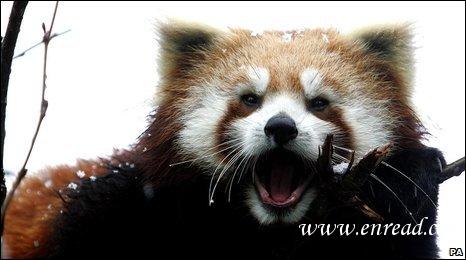| Red pandas have surprised researchers by demonstrating a liking of artificial sweeteners.
研究人员惊奇的发现小熊猫喜欢人工甜味剂。

The research could fuel the development of better sugar substitutes
The Journal of Heredity(遗传) research was investigating the sweet taste preferences of carnivorous(食肉的) animals.
While some of them preferred natural sugars, only pandas favoured aspartame(阿尔巴甜,人工、低卡甜味), neotame and sucralose.
The researchers believe the ability to taste such molecules(分子学) may have evolved because similar ones might exist among the panda's natural foods.
The receptors for sweet substances are formed from a pair of proteins, with the receptors'(受容器,摄取体) detailed shapes determining whether they react to natural or artificial sweeteners.
The team demonstrated in 2005 that the carnivore family Felidae(猫科) - which includes the big cats and the domesticated(驯服的,驯养的) variety - showed no preference for either natural sugars or sweeteners.
They went on to show that Felidae family animals only expressed one of the two genes that code for proteins that together form sweet receptors on animal tongues.
The new research investigated a number of animals in a similar taste test at two Swiss zoos, followed by genetic profiling. The animals included meerkats(海岛猫鼬), ferrets(白鼬), genets(香猫), mongoose(猫鼬), and lions as well as the pandas.
Over the course of a day, the animals were allowed to choose from two water sources: plain water or water sweetened using one of six natural or six artificial sweeteners.
Message received
In keeping with the prior(较早的,在先的) research, the lions showed no preference for water sweetened in any way.
All of the other animals showed some preference for at least one of the naturally sweetened water sources.
But pandas alone favoured the artificially sweetened water. Until now it was thought that only primates(灵长目) could taste aspartame, the pandas' favourite among the artificial sweeteners.
The researchers then looked at the genes that code for sweet receptors. Only the lions suffered from the "pseudogenisation" that prevents formation of the receptors; all of the others had some form of sweet receptors.
However, the genetic analysis showed subtle(微妙的,敏感的) differences in the fine structure of the pandas' receptors relative to all the other sweet-toothed animals.
"This may explain why the red panda is able to taste artificial sweeteners," said Xia Li, a researcher at the Monell Chemical Senses Center in Philadelphia and lead author of the study.
"What we don't know is why this particular animal has this unusual ability. Perhaps the red panda's unique sweet receptor evolved to allow this animal to detect some compound in its natural food that has a similar structure to these sweeteners."
The researchers will continue to study the fine interplay(相互影响) between the genes that code for sweet receptors, the molecules the receptors can bind to(订约,约定), and ultimately how that influences animals' diets.
"This is the essence of molecular science," said Monell's Joseph Brand, senior author of the research, "asking a behavioural question and getting a molecular answer."
来源:英文阅读网
|

